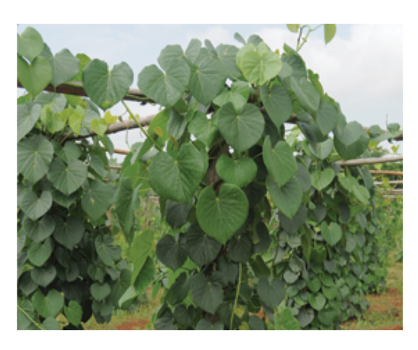Tuesday Poster Session
Category: Liver
P6107 - Case Report: Probable Drug-Induced Liver Injury Due to Heart-Leaved Moonseed
Tuesday, October 28, 2025
10:30 AM - 4:00 PM PDT
Location: Exhibit Hall

Toru Nakata, MD, PhD
University of Hawaii, John A. Burns School of Medicine, Department of Medicine
Honolulu, HI
Presenting Author(s)
Toru Nakata, MD, PhD1, Arvin Jeremy N. Tan, MD1, Yusuke Miyatani, MD1, Vishal Dobaria, MD1, Christy Ann L. Gilman, MD, MS2, Chuong Tran, MD3, Traci Murakami, MD, FACG4
1University of Hawaii, John A. Burns School of Medicine, Department of Medicine, Honolulu, HI; 2Queen's Medical Center, Honolulu, HI; 3John A. Burns School of Medicine, University of Hawaii, Honolulu, HI; 4Queens west, Honolulu, HI
Introduction: Heart-leaved Moonseed (Tinospora cordifolia), also known as Guduchi, is widely used in traditional
medicine as an immune booster (Fig.1). Despite its popularity, recent reports suggest a potential
association with drug-induced liver injury (DILI), although cases remain rare. We present a case of acute
hepatitis with a cholestatic pattern in an elderly male, likely related to long-term use of Heart-leaved
Moonseed.
Case Description/
Methods: A 77-year-old Asian male from Thailand with a history of type 2 diabetes,
hypertension, and hyperlipidemia presented with one week of dark urine. He denied abdominal pain,
fever, or alcohol use and had been in his usual state of health prior to symptom onset. Notably, he had
been taking T. cordifolia daily for 5–6 months as an immune supplement, which he discontinued a few
weeks prior. Initial labs showed a hepatocellular-predominant injury pattern with marked transaminitis
(AST 978 U/L, ALT 432 U/L), elevated total bilirubin (9.5 mg/dL; direct 7.3 mg/dL), and mildly elevated
INR (1.2). Acetaminophen and urine drug screen were negative. Imaging revealed periportal edema and
cholelithiasis without biliary obstruction or abnormal liver morphology. Extensive workup for viral,
metabolic, and genetic liver diseases was negative. Autoimmune testing revealed a positive ANA (1:640),
elevated ASMA (123 U), and elevated IgG (2072 mg/dL), raising suspicion for autoimmune or drug-
induced autoimmune hepatitis. The patient received a 72-hour N-acetylcysteine protocol without clinical
improvement. Because liver tests remained abnormal and autoimmune markers were positive,
corticosteroid therapy was started: intravenous Solu-Medrol followed by an oral prednisone taper. Liver
enzymes and bilirubin subsequently improved. He is now being monitored in the outpatient
setting.
Discussion: T. cordifolia is a popular traditional remedy, especially in South Asian countries. Although
reported cases of liver injury are rare, T. cordifolia has the potential to cause acute hepatitis, often
presenting with features resembling autoimmune hepatitis. Thus, careful monitoring for adverse effects
is warranted in patients using T. cordifolia.

Figure: (A) Heart-Leaved Moonseed
Cited from https://famepharma.com/heart-leaved-moonseed
Disclosures:
Toru Nakata indicated no relevant financial relationships.
Arvin Jeremy Tan indicated no relevant financial relationships.
Yusuke Miyatani indicated no relevant financial relationships.
Vishal Dobaria indicated no relevant financial relationships.
Christy Ann Gilman indicated no relevant financial relationships.
Chuong Tran indicated no relevant financial relationships.
Traci Murakami indicated no relevant financial relationships.
Toru Nakata, MD, PhD1, Arvin Jeremy N. Tan, MD1, Yusuke Miyatani, MD1, Vishal Dobaria, MD1, Christy Ann L. Gilman, MD, MS2, Chuong Tran, MD3, Traci Murakami, MD, FACG4. P6107 -
Case Report: Probable Drug-Induced Liver Injury Due to Heart-Leaved Moonseed, ACG 2025 Annual Scientific Meeting Abstracts. Phoenix, AZ: American College of Gastroenterology.
1University of Hawaii, John A. Burns School of Medicine, Department of Medicine, Honolulu, HI; 2Queen's Medical Center, Honolulu, HI; 3John A. Burns School of Medicine, University of Hawaii, Honolulu, HI; 4Queens west, Honolulu, HI
Introduction: Heart-leaved Moonseed (Tinospora cordifolia), also known as Guduchi, is widely used in traditional
medicine as an immune booster (Fig.1). Despite its popularity, recent reports suggest a potential
association with drug-induced liver injury (DILI), although cases remain rare. We present a case of acute
hepatitis with a cholestatic pattern in an elderly male, likely related to long-term use of Heart-leaved
Moonseed.
Case Description/
Methods: A 77-year-old Asian male from Thailand with a history of type 2 diabetes,
hypertension, and hyperlipidemia presented with one week of dark urine. He denied abdominal pain,
fever, or alcohol use and had been in his usual state of health prior to symptom onset. Notably, he had
been taking T. cordifolia daily for 5–6 months as an immune supplement, which he discontinued a few
weeks prior. Initial labs showed a hepatocellular-predominant injury pattern with marked transaminitis
(AST 978 U/L, ALT 432 U/L), elevated total bilirubin (9.5 mg/dL; direct 7.3 mg/dL), and mildly elevated
INR (1.2). Acetaminophen and urine drug screen were negative. Imaging revealed periportal edema and
cholelithiasis without biliary obstruction or abnormal liver morphology. Extensive workup for viral,
metabolic, and genetic liver diseases was negative. Autoimmune testing revealed a positive ANA (1:640),
elevated ASMA (123 U), and elevated IgG (2072 mg/dL), raising suspicion for autoimmune or drug-
induced autoimmune hepatitis. The patient received a 72-hour N-acetylcysteine protocol without clinical
improvement. Because liver tests remained abnormal and autoimmune markers were positive,
corticosteroid therapy was started: intravenous Solu-Medrol followed by an oral prednisone taper. Liver
enzymes and bilirubin subsequently improved. He is now being monitored in the outpatient
setting.
Discussion: T. cordifolia is a popular traditional remedy, especially in South Asian countries. Although
reported cases of liver injury are rare, T. cordifolia has the potential to cause acute hepatitis, often
presenting with features resembling autoimmune hepatitis. Thus, careful monitoring for adverse effects
is warranted in patients using T. cordifolia.

Figure: (A) Heart-Leaved Moonseed
Cited from https://famepharma.com/heart-leaved-moonseed
Disclosures:
Toru Nakata indicated no relevant financial relationships.
Arvin Jeremy Tan indicated no relevant financial relationships.
Yusuke Miyatani indicated no relevant financial relationships.
Vishal Dobaria indicated no relevant financial relationships.
Christy Ann Gilman indicated no relevant financial relationships.
Chuong Tran indicated no relevant financial relationships.
Traci Murakami indicated no relevant financial relationships.
Toru Nakata, MD, PhD1, Arvin Jeremy N. Tan, MD1, Yusuke Miyatani, MD1, Vishal Dobaria, MD1, Christy Ann L. Gilman, MD, MS2, Chuong Tran, MD3, Traci Murakami, MD, FACG4. P6107 -
Case Report: Probable Drug-Induced Liver Injury Due to Heart-Leaved Moonseed, ACG 2025 Annual Scientific Meeting Abstracts. Phoenix, AZ: American College of Gastroenterology.
